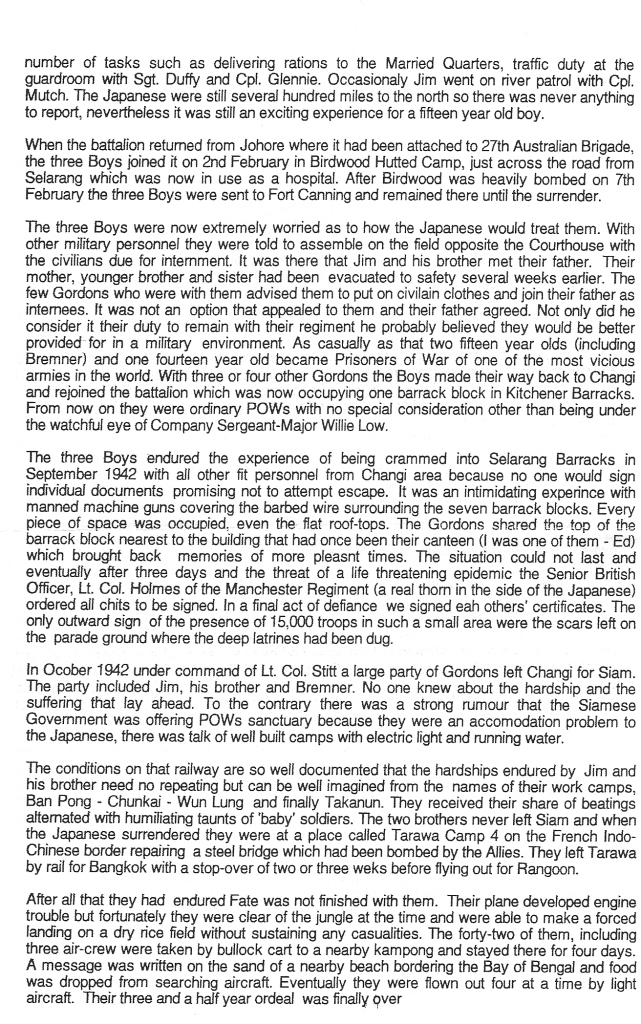number of taks such as delivering rations to the Married Quarters, traffic duty at the guardroom with Sgt. Duffy and Cpl. Glennie. Occasionaly Jim went on river patrol with Cpl. Mutch. The Japanese were still several hundred miles to the north so there was never anything to report, nevertheless it was still an exciting experience for a fifteen year old boy.
When the battalion returned from Johore where it had ben attached to 27th Australian Brigade, the three Boys joined it on 2nd February in Birdwood Hutted Camp, just across the road from Selarang which was now in use as a hospital. After Birdwood was heavily bombed on 7th February the three Boys were sent to Fort Canning and remained there until the surrender.
The three Boys were now extrenely worried as to how the Japanese would treat them. With other military personnel they were told to assemble on the field opposite the Courthouse with the civilians due for internment. It was there that Jim and his brother met their father. Their mother, younger brother and sister had been evacuated to safely several weeks earlier. The few Gordons who werewith them advised them to put on civilian clothes and join their father as internees. It was not an option that appealed to them and their father agree. Not only did he consider it their duty to remain with their regiment he probably believed they would be better provided for in a military environment. As casually as that two fifteen year olds (including Bremner) and one fourteen year old became Prisoners of War of one of the most vicious armies int he world. With three or four other Gordons the Boys made their way back to Changi and rejoined the battalion which was now occupying one barrack block in Kitchener Barracks.From now on they were ordinary POWs with no special consideration other than being under the watchful eye of Company Sergeant-Major Willie Low.

In October 1942 under command of Lt. Col. Stitt a large party of Gordons left Changi for Siam. The party included Jim, his brother and Bremner. No on knew about the hardship and the suffering that lay ahead. To the contrary there was a strong rumour that the Siamese Government was offering POWs sanctuary because they were an accommodation problem to the Japanese, there was talk of well built camps with electric light and running water.
The conditions on that railway are so well documented that the hardships endured by Jim and his brother need no repeating but can be well imagined from the names of their work camps, Ban Pong - Chunkai - Wun Lung and finally Takanun. They received their share of beatings alternated with humiliating taunts of 'baby' soldiers. The two brothers never left Siam and when the Japanese surrendered they were at a place called Tarawa Camp 4 on the Fren Indo-Chineses border repairing a steel bridge which had been bombed by the Allies. They left Tarawa by rail for Bangkok with a stop-over of two or three weeks before flying out for Rangoon.
After all that they endured Fate was not finished with them. Their plane developed engine trouble but fortunately they were clear of the jungle at the time and were able to make a forced landing on a dry rice field without sustaining any casualties. The forty-two of them, including three air-crew were taken by bullock cart to a nearby kampong and stayed there for four days. A message was written on the sand of a nearby beach bordering the Bay of Bengal and food was dropped from searching aircraft. Eventually they were flown out four at a time by light aircraft. Their three and a half year ordeal was finally over